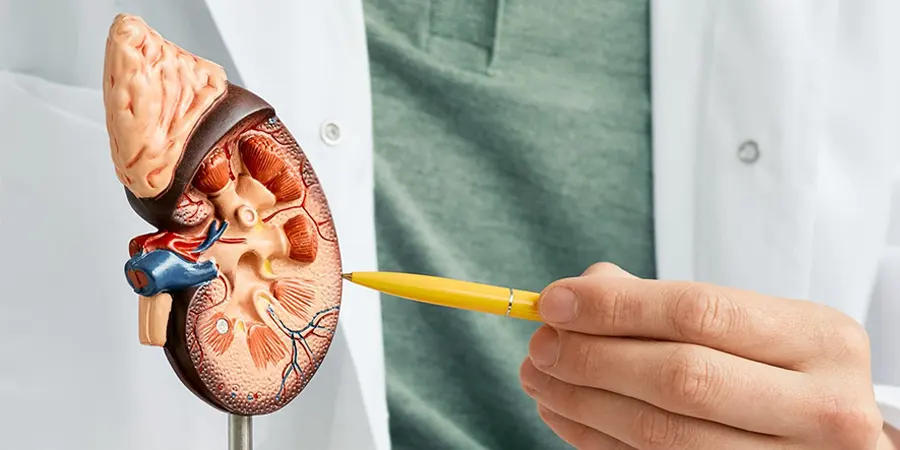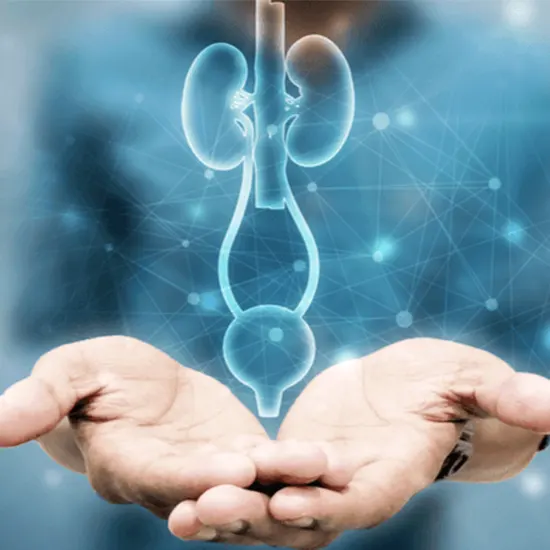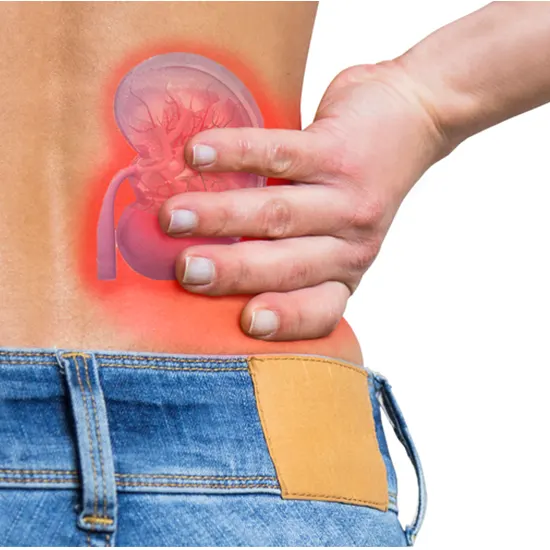
Kidneys are bean-shaped organs that are located in the back of the abdomen. The main role of kidneys is to filter the waste products from the blood and produce urine. Kidney cancer, also known as renal cell carcinoma, is a...
Kidneys are bean-shaped organs that are located in the back of the abdomen. The main role of kidneys is to filter the waste products from the blood and produce urine. Kidney cancer, also known as renal cell carcinoma, is a type of cancer that starts in the kidney cells. The most common type of cancer of the kidney is renal cell carcinoma, which accounts for around 90%-95% of cancer of the kidneys. Other types of kidney cancer include transitional cell carcinoma, Wilms tumor, and renal sarcoma accounts for 5% to 10%.
Types of kidney cancer
There are several types of kidney cancer, but the most common type is renal cell carcinoma, which accounts for about 90% of all kidney cancers.
Other types of kidney cancer include:
Transitional cell carcinoma: This type of kidney cancer starts in the renal pelvis and ureter lining, which are the tubes that carry urine from the kidneys to the bladder.
Wilms tumor: This type of kidney cancer is very rare and typically affects children under the age of 5.
Renal sarcoma: This is also a rare type of kidney cancer that begins in the connective tissue of the kidney.
Oncocytoma: This is a non-cancerous type of tumor that usually doesn't require treatment.
Stages of Kidney Cancer
The stages of kidney cancer are typically based on the TNM system. This system takes into account the size of the Tumor (T), The spread of cancer means whether cancer has spread to the nearby lymph nodes (N) and whether cancer has metastasized, or spread to other body parts (M).
The stages of kidney cancer are:
Stage 1 : At Stage-1, the size of the tumor is very small it's less than 7 cm in diameter and it's confined to the kidney.
Stage II : At this stage-2, the size of the tumor is larger in diameter. It's more than 7cm but is still confined to the kidney.
Stage III : At this stage-3, the tumor is confined to the Gerota’s fascia or it involves the nearby lymph nodes. The extension of the tumor at this stage is through the renal capsule. In other words, we can say that at this stage, the tumor has either grown into nearby blood vessels or tissues or has spread to nearby lymph nodes.
Stage IV : At the IV stage of kidney cancer, the tumor has spread to adjacent organs, lymph nodes, or distant metastases.

The Survival rate of patients with kidney cancer is based on the stage of kidney cancer. So, it is an important factor in determining the stages, and best treatment options and predicting the likely outcome of the disease.
Symptoms of kidney Cancer
The signs or symptoms of kidney cancer usually is not visible at the initial stage. As cancer grows and spreads, it starts causing various symptoms, which may include:
- Blood in the urine
- A lump in the abdomen or side
- The abnormal mass growth in the side or abdomen
- Pain in the side or lower back that doesn't vanish
- The pressure in the lower back or on the side that persists
- Unexplained loss of weight
- Fatigue
- Loss of appetite
- Fever
- Anaemia
- Swelling in the legs
- Swollen ankles
- High blood pressure
These symptoms may be caused by other medical conditions, but if you experience any of them, it's important to talk to your doctor to confirm whether it's an indication of kidney cancer or any other medical issue. If kidney cancer is diagnosed early, there is a better chance of successful treatment.
Causes of Kidney Cancer
Several factors can increase the risk of developing kidney cancer. These causes or risk factors include:
Smoking : Cigarette smoking is the most common cause or risk factor for kidney cancer. Compare to non-smokers, Smokers are twice as likely to develop kidney cancer.
Excessive Weight : Individuals who are overweight are at higher risk for kidney cancer.
High blood pressure : High blood pressure at a chronic level can increase the risk of kidney cancer.
Family history : An individual with a family history of kidney cancer increases the risk of developing cancer of the kidneys.
Certain genetic conditions : Some inherited genetic conditions, such as Von Hippel-Lindau disease, Birt-Hogg-Dubé syndrome, and hereditary papillary renal cell carcinoma, increase the risk of kidney cancer.
Exposure to certain chemicals : Exposure to certain chemicals, such as asbestos, cadmium, and organic solvents, may increase the risk of kidney cancer.
Age : The risk of kidney cancer increases with age, with most cases diagnosed in people over the age of 60.
Prevention of Kidney Cancer
There are several preventive steps you can take to reduce your risk of developing kidney cancer disease.
Here are some prevention tips
Quit smoking : If you smoke, quitting is the best way to reduce your risk of originating kidney cancer.
Maintain a healthy weight : If you are overweight, maintaining or losing your weight can reduce your risk of expanding or spreading kidney cancer.
Exercise regularly : Regular physical activity can help maintain a healthy weight and reduce the chance of being a candidate for kidney cancer.
Modifying your diet : Eating a healthy diet which is rich in fruits, vegetables, whole grains, and lean proteins may help reduce the risk of kidney cancer.
Control high blood pressure : If you have high blood pressure, work with your doctor to keep it under control to lower the chance of spreading or developing kidney cancer.
Drink plenty of water : Staying hydrated may help reduce the risk of kidney cancer.
Avoid exposure to harmful chemicals : If you work with or around harmful chemicals, follow safety guidelines to reduce your exposure.
Know your family history : If you have a family history of kidney cancer, talk to your doctor about ways to reduce your risk.
By taking these steps, you can help reduce your risk of developing kidney cancer. It's also important to talk to your doctor about any concerns you may have and to get regular check-ups to detect any potential problems early.
Diagnosis of Kidney Cancer
The doctor diagnoses kidney cancer using various methods such as physical examination, medical history, and diagnostic procedures.

Physical Examination : The doctor asks you about your medical history and performs a physical examination to check whether there is any abnormality or lump present on the abdomen or back.
If the doctor suspects that an individual may have cancer of the kidney based on their symptoms, physical examination as well as medical history. Then they may recommend several diagnostic tests to confirm the diagnosis of the kidney cancer problem. Here are some of the diagnostic procedures (pathology and radiology procedures) that are used to diagnose kidney cancer.
Urine Test : Urinalysis is performed to detect whether there is blood in the urine. The presence of urine in the blood may indicate the existence of kidney-related issues.
Blood Tests : Blood tests such as LFT, KFT, and CBC can help detect abnormal levels of substances that may be associated with kidney cancer.
Renal Mass Biopsy : The renal mass biopsy involves the removal of a small sample of tissues from the kidney and examining it under a microscope to check for cancer cells.
Imaging tests : Once a diagnosis of kidney cancer is confirmed, additional tests may be performed to determine the stage of cancer and whether it has spread to other parts of the body. This information about the stages, size and spread of kidney cancer helps in determining the best course of treatment. Imaging tests, such as CT Renal Angiography, MRI kidney scans, Ultrasound whole abdomen, and whole body pet scan create detailed images of the kidneys and surrounding areas, which can help detect any abnormalities.
Benefits of Early Detection of Kidney Cancer
The benefits of early detection of kidney cancer includes:
Increased chances of successful treatment : If kidney cancer is detected early, then the chance of getting successful treatment to reduce the growth of the cancer is higher. In the initial stage of kidney cancer, the size of the tumor is usually small and contained within the kidney, this makes it easier for the doctor to remove the tumor with a surgical procedure. Even this can improve the chances of complete removal of cancer and reduce the need for further treatment.
Reduced risk of complications : The initial level of detection of kidney cancer can reduce the risk of complications associated with advanced kidney cancer, such as blood clots, kidney failure, and high blood pressure.
More treatment options : It can also provide a lot of treatment options such as surgery, radiation therapy, chemotherapy, targeted therapy, or a combination of all therapies based on the stage and location of the kidney cancer.
Improved quality of life : Early detection and early treatment of kidney cancer not only improve a patient's quality of life but also reduce the physical and emotional burden of cancer.
Lower healthcare costs : Early detection of cancer helps in reducing the need for extensive and costly treatment for advanced levels of cancer. In this way, it also helps to lower healthcare costs by reducing the need for extensive and costly treatment.
Conclusion
In summary, the early detection of kidney cancer can lead to better treatment outcomes, fewer complications, more treatment options, improved quality of life, and lower healthcare costs. An early diagnosis of kidney cancer gives your healthcare a clear picture of your problem and its severity. It helps in deciding the best treatment to prevent it from recurrence.
Being the leader in the diagnostic industry, Ganesh Diagnostic and Imaging Centre offer you the best kidney cancer screening package for early detection of kidney cancer even before it starts developing the symptoms. To know about kidney cancer diagnostic tests, feel free to contact our highly experienced healthcare executives.









